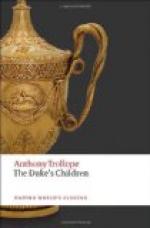‘You will have to give that up, Tregear.’
‘I think not.’
‘Yes you will; my father will never stand it.’
’I don’t know what there is to stand. I am not noble, nor am I rich; but I am as good a gentleman as he is.’
‘My dear fellow,’ said the young lord, ’you know very well what I think about all that. A fellow is not better to me because he has got a title, nor yet because he owns half a county. But men have their ideas and feelings about it. My father is a rich man, and of course he’ll want his daughter to marry a rich man. My father is noble, and he’ll want his daughter to marry a nobleman. You can’t very well marry Mary without his permission, and therefore you had better let it alone.’
‘I haven’t even asked his permission as yet.’
’Even my mother was afraid to speak to him about it, and I never knew her to be afraid to say anything else to him.’
‘I shall not be afraid,’ said Tregear, looking grimly.
‘I should. That’s the difference between us.’
‘He can’t very well eat me.’
’Nor even bite you;—nor will he abuse you. But he can look at you, and he can say a word or two which you will find it very hard to bear. My governor is the quietest man I know, but he has a way of making himself disagreeable when he wishes, that I never saw equalled.’
‘At any rate, I had better go and see your Mrs Finn.’ Then Tregear wrote a line to Mrs Finn, and made his appointment.
CHAPTER 4
Park Lane
From the beginning of the affair Tregear had found the necessity of bolstering himself up inwardly in his attempt by mottoes, proverbs, and instigations of courage addressed to himself. ’None but the brave deserve the fair.’ ’De l’audace, et encore de l’audace, et toujours de l’audace.’ He was a man naturally of good heart in such matters, who was not afraid of his brother-men, nor yet of women, his sisters. But in this affair he knew very much persistence would be required of him, and that even with such persistence he might probably fail, unless he should find that more than ordinary constancy in the girl. That the Duke could not eat him, indeed that nobody could eat him as long as he carried himself as an honest man and a gentleman, was to him an inward assurance on which he leaned much. And yet he was conscious, almost with a feeling of shame, that in Italy he had not spoken to the Duke about his daughter because he was afraid lest the Duke might eat him. In such an affair he should have been careful from the first to keep his own hands thoroughly clean. Had it not been his duty as a gentleman to communicate with the father, if not before he gained the girl’s heart, at any rate as soon as he knew he had done so? He had left Italy thinking that he would certainly meet the Duchess and her daughter in London, and that then he might go to the Duke as though this




